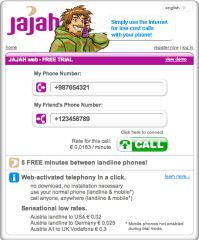Net telephony with a twist

Set up by founders Daniel Mattes and Roman Scharf, Jajah is a tad different from current Net telephony products from the likes of Skype, MSN and Yahoo.
 To make phone calls, users key in their phone number and the number of the other party on Jajah's Web site. |
Users do not need to install any additional software on a PC to use Jajah's Net telephony offering. Instead, the service is initiated through the company's Web site.
Users only need to visit the Web site and key in their phone number, followed by the number they wish to dial. Jajah's servers will subsequently call both parties on their traditional telephones and make the connection. Because calls are routed through Jajah's network, users do not even require a broadband connection.
But delivering Net telephony services through a Web site was not something Jajah's founders thought of immediately, or at least, in 2005 when the company was first established. Back then, Jajah had required its users to download a software tool in order to start making calls.
Jajah spokesperson Markus Rumler, said the launch of the company's software client was "quite successful with 50,000 downloads within 48 hours". The application has since been discontinued.
"But Roman and Daniel were unhappy as it was not too easy to use," Rumler told ZDNet Asia. "They then read an IDC report stating that only 3 percent of Internet users use VoIP (voice of Internet protocol), while 95 percent use search engines. The conclusion was to make VoIP as easy as searching a keyword on Google."
Jajah users pay nothing for the first five minutes of a phone call to almost anywhere in the world. Beyond that time limit, they will have to pay for subsequent call minutes at prices comparable to those offered by Skype. Value-added services such as SMS (short messaging service) and call scheduling, where users can set a time for a call to take place, are also available for a fee.
Rumler declined to reveal how many users Jajah has signed up so far, though he said the company is targeting to attract 1 million registered users by year-end.
"We have a great conversion rate, where 95 out of 100 users who visit our Web site end up trying our service," he said, adding that almost 60 percent of registered users are paid customers.
To widen its user base, Jajah introduced a "global free calling plan" last month that allows users to make free landline and mobile calls within, and to "the most called places on Earth", Rumler said. These include Singapore, Taiwan, Hong Kong, China, the United
States and Canada. The new service also applies to landline calls to and within Australia, the United Kingdom, Germany, France, Italy and most other European countries.Jajah spokesperson
There is, however, a catch. Because fees collected from paying customers are in effect used to subsidize free phone calls, Jajah has spelt out a "fair use policy" that requires users to limit their free hours to about one hour a day, 5 hours a week and some 15 hours a month.
"If they use more than that [limit], we'll ask that they also use some [fee-based] Jajah services," Rumler said. "If we determine that over time, someone's behavior does not favor the overall community, we'll simply ask that they not use the free service."
If a single user continues to behave in a way that does not favor the community, he's simply asked to leave the system," he noted.
Scott Morrison, research director at Gartner, said the fact that no PC is used during a Jajah call will be an attractive option for many users.
"It remains to be seen whether [Jajah's] business model, while attractive to end users, will produce sufficient revenue to cover its costs," Morrison wrote on a Gartner blog.
According to Rumler, Jajah has been profitable since its Web-enabled telephony service began in February this year, although he declined to reveal specific revenue figures.
To lure business users to its service, Jajah has also started a business plan that allows companies to give employees accounts--with Jajah--with pre-determined individual call limits.
Companies can also integrate Jajah's API (application programming interface) into their corporate Web sites, where customers can contact these organizations directly through Jajah's service by clicking on a "Call Me" button.
Rumler said: "For a company, there is no reason not to use a Jajah business account as there are no additional investments necessary. [They] can use their existing telephone infrastructure."
Although Jajah does not provide quality-of-service (QoS) assurances to its enterprise customers, Rumler said the company's service has not encountered any downtime so far, except for the occasional maintenance and upgrading work.
Turning the focus on Asia
Bolstered by its initial success, Jajah is already looking to expand its global footprint. In April, the company raised US$5 million from Globespan Capital, a global venture capital firm with core competence in business development in Asia.
Rumler said Jajah is now cooperating with companies in Japan and South Korea to expand its presence in Asia. Early next year, Jajah will turn its attention to China, Singapore and India. It might also have set up an Asian office by then, he added.